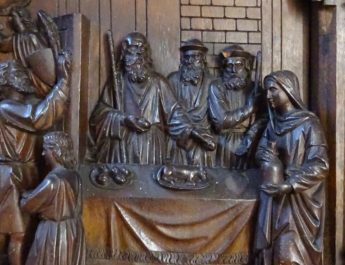2 Corinthians 8:7-15
Ordinary B31
7 Now as you excelA in everything—in faith,B in speech,C in knowledge,D
A “excel” = perisseuo. From perissos (abundant, more, excessive, advantage, vehemently); from peri (all-around, encompassing, excess). This is more than what is ordinary or necessary. It is abounding, overflowing, being leftover, going above and beyond. It is super-abounding in number or quality.
B “faith” = pistis. From peitho (to have confidence, urge, be persuaded, agree, assure, believe, have confidence, trust). This is less about knowing, believing, and repeating a list of doctrines then it is about trusting God. Faith means listening to God and seeking to live a holy life even (and especially) when we don’t understand how everything works or fits together. Faith is about being faithful (trusting and doing) rather than being all knowing.
C “speech” = logos. From lego (to speak, tell, mention). This is word, statement, speech, analogy. It is a word that carries an idea or expresses a thought, a saying. It could refer to a person with a message or reasoning laid out in words. By implication, this could be a topic, line of reasoning, or a motive. It can be used for a divine utterance or as Word – Christ.
D “knowledge” = gnosis. From ginosko (to know, recognize, realize, perceive, learn; gaining knowledge through personal experience). This is knowing, knowledge, understanding, wisdom. It is direct knowledge – working knowledge that links theory and application.
in utmost eagerness,E and in our loveF for you—so we want you to excel also in this generous undertaking.G
E “eagerness” = spoude. 12x in NT. From speudo (to hurry, urge on, await); probably from pous (foot in a figurative or literal sense). This is haste, diligence, earnestness, effort. It is being swift to demonstrate one’s enthusiasm. It is doing what one is told right away and with full effort.
F “love” = agape. From agapao (to love, take pleasure in, esteem; to prefer). This is love, goodwill, benevolence. It is God’s divine love or human love that mirrors God’s love.
G “generous undertaking” = charis. From chairo (to rejoice, be glad; used to say hello; properly, delighting in the grace of God or experiencing God’s favor); from char– (to extend favor, lean towards, be inclined to be favorable towards). This is grace, kindness, favor, gratitude, thanks. It is the sense of being inclined to or favorable towards – leaning towards someone to share some good or benefit. This can be literal, figurative, or spiritual. It is grace as abstract concept, manner, or action.
8 I do not say this as a command,H but I am testingI the genuinenessJ of your love against the earnestnessK of others.L
H “command” = epitage. 7x in NT. From epitasso (to arrange, command, charge); {from epi (on, upon, to, against, what is fitting) + tasso (to arrange, appoint, determine)}. This is a command, instruction, authority, decree.
I “testing” = dokimazo. From dokimos (what passes the test, approved, acceptable, genuine, verified); from dechomai (to warmly receive, be ready for what is offered, take, accept, or welcome; to receive in a literal or figurative sense) or dokeo (to have an opinion, seem, appear, suppose; a personal judgment; to think); {from dokos (opinion)}. This is to test, examine, prove. It is to approve after subjecting to a test to determine if it is real or acceptable. It is to test in a literal or figurative sense.
J “genuineness” = gnesios. 4x in NT. From ginomai (to come into being, to happen, become, be born; to emerge from one state or condition to another; this is coming into being with the sense of movement or growth) OR from the same as genesia (birthday celebration); {from genesis (origin, lineage, life, nativity, nature, generation); from the same as genea (family, generation, kind, or nation; an age as a period of time, infinity); from genos (family, offspring, kin – in a literal or figurative sense); from ginomai (see above)}. This is literally one who was born within wedlock or born according to the law. Figuratively, it means real, genuine, sincere, true – true from its origins, authentic, legitimate. This is an affectionate connotation.
K “earnestness” = spoude. Same as “eagerness” in v7. See note E above.
L “others” = heteros. This is other, another, different, strange. It is another of a different kind in contrast to the Greek word allos, which is another of the same kind. This could be a different quality, type, or group.
9 For you knowM the generous actN of our LordO JesusP Christ,Q
M “know” = ginosko. Related to “knowledge” in v7. See note D above.
N “generous act” = charis. Same as “generous undertaking” in v7. See note G above.
O “Lord” = Kurios. From kuros (authority, supremacy). This is a respectful address meaning master or sir. It refers to one who has control or power greater than one’s own. So, it was also applied to God and Jesus as Master or Lord.
P “Jesus” = Iesous. From Hebrew Yehoshua (Joshua, the Lord is salvation); {from YHVH (proper name of the God of Israel; the self-existent and eternal one); {from havah (to become) or from hayah (to come to pass, become, be)} + yasha (to deliver, defend, help, preserve, rescue; properly, to be open, wide or free, which implies being safe. So, in a causative sense, this is to free someone)}. This is Jesus or Joshua in Greek – the Lord saves or the Lord is salvation.
Q “Christ” = Christos. From chrio (consecrate by anointing with oil; often done for prophets, priests, or kings). Literally, the anointed one, Christ. The Greek word for Messiah.
that though he was rich,R yet for your sakes he became poor,S so that by his povertyT you might become rich.U
R “rich” = plousios. From ploutos (abundance, wealth, or riches; money, possessions, spiritual abundance, or a valuable bestowment); from polus (much, many, abundant) OR pleo (to sail, voyage); {probably from pluno (to plunge – so to wash); from pluo (to flow)} OR pletho (to fill, accomplish, supply; to fill to maximum capacity). This is wealthy, having full resources. It can be a rich person or refer to God’s abundance.
S “became poor” = ptocheuo. 1x in NT. From ptochos (destitute – someone who is extremely poor and bowed down because of a long struggle under poverty; properly, it means bent over, figuratively, someone who is deeply destitute and lacking tangible resources; as extremely opposite a wealthy person as possible); from ptosso (to crouch or cower as a beggar does). This is to be poor or destitute, helpless.
T “poverty” = ptocheia. Related to “became poor” in v9. 3x in NT. From ptocheuo (to be poor, destitute, helpless); from ptochos (see note S above). This is poverty or destitution in a literal or figurative sense.
U “become rich” = plouteo. Related to “rich” in v9. 12x in NT. From ploutizo (to enrich, cause abundance, bring fullness); from ploutos (see note R above) OR pleo (to sail, voyage); {probably from pluno (to plunge – so to wash); from pluo (to flow)} OR pletho (to fill, accomplish, supply; to fill to maximum capacity). This is to be rich or abound in. It is to be or get wealth in a literal or figurative sense.
10 And in this matter I am givingV my advice:W it is appropriateX for you who beganY last year not only to doZ something but even to desireAA to do something—
V “giving” = didomi. To give, offer, place, bestow, deliver. This is give in a literal or figurative sense.
W “advice” = gnome. Related to “knowledge” in v7 & “know” in v9. 9x in NT. From ginosko (see note D above). This is counsel, decision, opinion, resolve, purpose. It is a an individual determination made within a personal relationship.
X “is appropriate” = sumphero. 17x in NT. From sun (with, together with) + phero (to bear, bring, lead, make known publicly; to carry in a literal or figurative sense). This is to collect, bring together, or be profitable to. It is combining things such that there is gain or profit or advantage.
Y “began” = proenarchomai. 2x in NT. From pro (before, earlier, above) + enarchomai (to begin, to rule); {from en (in, on, at, by with, among) + archo (to rule, begin, have first rank or have political power)}. This is to begin previously, the first one to begin.
Z “do” = poieo. This is to make, do, act, construct, abide, or cause.
AA “desire” = thelo. This is to wish, desire, will, or intend. It is to choose or prefer in a literal or figurative sense. It can also mean inclined toward or take delight in. It can have a sense of being ready to act on the impulse in question.
11 now finishBB doing it, so that your eagernessCC may be matched by completing it according to your means.DD
BB “finish” = epiteleo. 10x in NT. From epi (on, upon, against, what is fitting) + teleo (to complete, fulfill, accomplish, end); {from telos (an end, aim, purpose, completion, end goal, consummation, tax; going through the steps to complete a stage or phase and then moving on to the next one)}. This is to complete or make perfect, execute, accomplish, undergo or finish.
CC “eagerness” = prothumia…thelo. Prothumia is 5x in NT. From prothumos (willing, eager, ready, enthusiastic, free from resistance; predisposed, willing, or generous from one’s own impulse); {from pro (before, ahead, earlier than, above) + thumos (passion, actions that stem from passion or impulse; can be rage, indignation); {from thuo (to breathe violently, seethe, rage; properly, to rush as breathing heavy; so smoke as in offering an animal sacrifice by fire; by extension, killing or slaying in general)}}. This is eagerness, readiness – already inclined to do something, promptness. Thelo is the same as “desire” in v10. See note AA above.
DD “means” = echo. This is to have, hold, possess.
12 For if the eagerness is there,EE the gift is acceptableFF according to what one has—not according to what one does not have. 13 I do not mean that there should be reliefGG for othersHH and pressureII on you, but it is a question of a fair balanceJJ between
EE “is there” = prokeimai. 5x in NT. From pro (before, ahead, earlier than, above) + keimai (to lie, recline, set, be appointed, be destined). This is to be present, set forth, exhibit, to set in view, to show as an example, be first.
FF “acceptable” = euprosdektos. Related to “testing” in v8. 5x in NT. From eu (good, well, rightly) + prosdechomai (to receive, welcome, expect, accept; reception with a warm, personal welcome or active waiting; also endurance or patience); {from pros (at, to, toward, with) + dechomai (see note I above)}. This is acceptable, welcome, pleasing, favorable.
GG “relief” = anesis. 5x in NT. From aniemi (to sen dup, loosen, sink, abandon, forbear, slacken, desert); {from ana (up, again, back, among, anew) + hiemi (to send)}. This is some kind of loosening or ease. It can also be a relief, freedom, or indulgence.
HH “others” = allos. This is other, another. Specifically, it is another of a similar kind or type. There is a different word in Greek that speaks of another as a different kind (heteros).
II “pressure” = thlipsis. From thlibo (to press in on and make narrow, rub together, constrict; figuratively to oppress or afflict). This is pressure that hems us in – used often of internal pressure that makes us feel like we have no other options and are confined or restricted. So, this is persecution, affliction, trouble, distress, and anguish. There is a different word, stenoxoria, that refers to external pressure that we feel from what’s going on.
JJ “fair balance” = isotes. 3x in NT. From isos (equal, same, similar, consistent); perhaps from eido (to know, remember, perceive – to see and so understand). This is equality, likeness, equity. It can be alike in status or measure.
14 your presentKK abundanceLL and their need,MM so that their abundance may beNN for your need, in order that there may be a fair balance.
KK {untranslated} = kairos. This is season, opportunity, occasion. The word chronos is used for chronological time. Kairos is used for spiritually significant time – the right time or appointed time.
LL “abundance” = perisseuma. Related to “excel” in v7. 5x in NT. From perisseuo (see note A above). This is abundance, overflow, more than was expected up to the limit – a super-plus.
MM “need” = husterema. 9x in NT. From hustereo (to fall behind, come late, be interior, suffer need, be left out); from husteros (last, later). This is something lacking. So it could be a need or a defect. It could be a shortcoming or poverty.
NN “be” = ginomai. Related to “genuineness” in v8. See note J above.
15 As it is written,OO
“The one who had muchPP did not have too much,QQ
and the one who had littleRR did not have too little.”SS
OO “written” = grapho. This is to write or describe. It is where the word “graphic” comes from.
PP “much” = polus. Related to “rich” and “become rich” in v9. See note R above.
QQ “have too much” = pleonazo. Related to “rich” and “become rich” in v9 & “much” in v15. 9x in NT. From pleion (many, more, great, having a greater value, more excellent); from polus (see note R above). This is to abound, increase, to superabound. It shares a root with “pleonasm.”
RR “little” = oligos. This is few or small – it can be a short time or extent, low light, amount, or worth.
SS “have too little” = elattoneo. 1x in NT. From elasson (smaller, inferior, younger, less, worse; smaller in a variety of possible aspects); from the same as elachistos (smallest or littlest in the sense of size, amount, rank, dignity, and so on); from elachus (short); used as a superlative for mikros (small). This is to have lack, diminish, or fall short.
Image credit: “Sharing” by ryancr, 2005.




